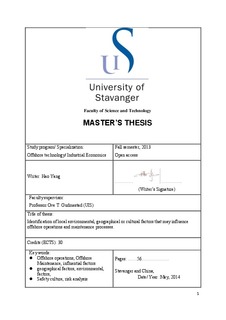| dc.contributor.author | Yang, Hao | |
| dc.date.accessioned | 2015-12-04T12:38:56Z | |
| dc.date.available | 2015-12-04T12:38:56Z | |
| dc.date.issued | 2014-06-16 | |
| dc.identifier.uri | http://hdl.handle.net/11250/2367025 | |
| dc.description | Master's thesis in Industrial economics | nb_NO |
| dc.description.abstract | The oil and gas industry has evolved for centuries. The development of the society and the rapid grow of global economy require energy as a driven force for the engine of global economy plays a significant role in providing sustainable development for the nations’ civilization. Although a diversification pattern of use of energy has established, fossil fuels such as coal, petroleum and natural gas still occupy the dominant position in energy consumption. In China, over 490 million tons of oil was consumed in 2012, and this number will still increase in the future.
However, with oil and gas production approaching its tail end on many onshore oilfields in China, the oil companies are seeking new opportunities towards the deep ocean to open up a new turn of exploration and production. The South China Sea, which is considered as the potential sustaining area for the future growth of the nation’s economy, contains probably billons of tons of oil and gas resources. Due to the high risk and high investment in offshore oil exploration and production, safety is considered as the primary principle in any offshore operations by almost all oil companies. Therefore, in order to avoid any fatalities, environmental incidents, and unnecessary stopping in offshore operations, a set of factors ranging from environmental, geographical and cultural aspects should be identified to minimize the potential risk before any operations can be undertaken.
The major objective of this thesis is to identify the possible factors that may influence offshore operations and maintenance processes from environmental, geographical and cultural aspects. And how those parameters affect offshore operations will be discussed also to find out the inner connection between influential factors and offshore operations.
In this thesis, a series of methodologies with respect to risk analysis & risk assessment, decision making engineering and ergonomics will be used to analyze the causes and consequences related to the influence factors on offshore operations and maintenance processes. And a risk-based methodology with regards to offshore operations will be proposed to provide helpful information contributing to show how to identify and deal with circumstance in offshore operations and maintenance processes. | nb_NO |
| dc.language.iso | eng | nb_NO |
| dc.publisher | University of Stavanger, Norway | nb_NO |
| dc.relation.ispartofseries | Masteroppgave/UIS-TN-IØRP/2014; | |
| dc.subject | industriell økonomi | nb_NO |
| dc.subject | petroleumsteknologi | nb_NO |
| dc.subject | boreteknologi | nb_NO |
| dc.title | Identification of local environmental, geographical or cultural factors that may influence offshore operations and maintenance processes. | nb_NO |
| dc.type | Master thesis | nb_NO |
| dc.subject.nsi | VDP::Technology: 500::Rock and petroleum disciplines: 510 | nb_NO |
| dc.subject.nsi | VDP::Social science: 200::Economics: 210::Economics: 212 | nb_NO |
